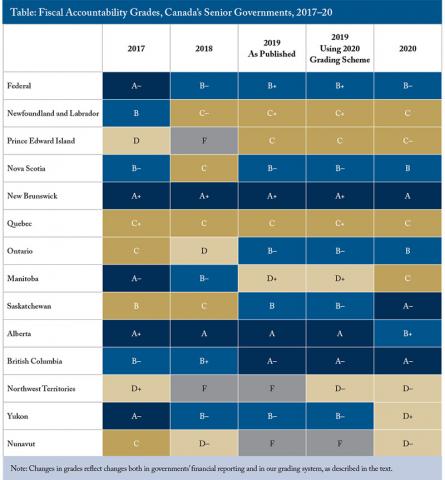From: William B.P. Robson and Farah Omran
To: Canada’s Ministers of Finance
Date: August 19, 2020
Re: Fiscal Accountability: Our Annual Report Card
With Canadian governments responding to the COVID-19 crisis with unprecedented spending and borrowing, the quality of the financial information they present is becoming more important than ever. While much of the financial information presented to legislators and the public by Canada’s federal, provincial and territorial governments is transparent, reliable and timely, we have too many examples of information that is opaque, misleading and late. Despite improvements over time, moreover, the federal government’s failure to produce a budget this year shows that Canadians cannot take fiscal accountability for granted.
Canada’s senior governments raise and spend huge amounts, and have legally unlimited capacity to borrow when their revenues falls short of their expenses. Holding public officials accountable for their use of these funds is a foundational task of representative government. In pursuit of such accountability, citizens and taxpayers have a number of tools: the budgets governments present around the beginning of the fiscal year; the estimates legislatures vote to approve specific programs and the audited financial statements governments present in their public accounts after year-end.
The C.D. Howe Institute’s annual report card on the usefulness of these government financial documents assigns letter grades that reflect how readily an interested but non-expert user may find, understand and act on the information therein.
In this year’s report card, which covers financial statements for fiscal year 2018/19 and budgets and estimates for 2019/20, New Brunswick tops the class with an A; British Columbia and Saskatchewan, each with A–, come close behind. At the other end of the scale are Yukon, with a D+, and the Northwest Territories and Nunavut, each with D–. Alberta, with a B+, and Ontario and Nova Scotia, each with B this year, could join the top rank next year with relatively small improvements, such as moving key numbers closer to the front of their budgets and more timely presentation and publication.
The federal government, which earned a B–, could raise its grade with similar changes – but its failure so far to produce a budget at all for 2020/21 prefigures a failing grade next year.
(The Table below shows this year’s grades and recent past performance. Because we added a criterion related to the transparency of bottom-line measures this year, we show last year’s grades as originally published and as we would have calculated them with this year’s criteria.)
Two decades ago, none of Canada’s senior governments budgeted and reported its revenues, expenses and bottom line on the same accounting basis; today, accounting consistent with public sector accounting standards is the rule. Canada’s governments, however, can do better. This annual report card hopes to encourage further progress and limit backsliding. If Canadians demand more transparent financial reporting and better fiscal accountability from their governments, they can get it.
William B.P. Robson is CEO of the C.D. Howe Institute where Farah Omran is a policy analyst.
To send a comment or leave feedback, email us at blog@cdhowe.org.
The views expressed here are those of the authors. The C.D. Howe Institute does not take corporate positions on policy matters.






